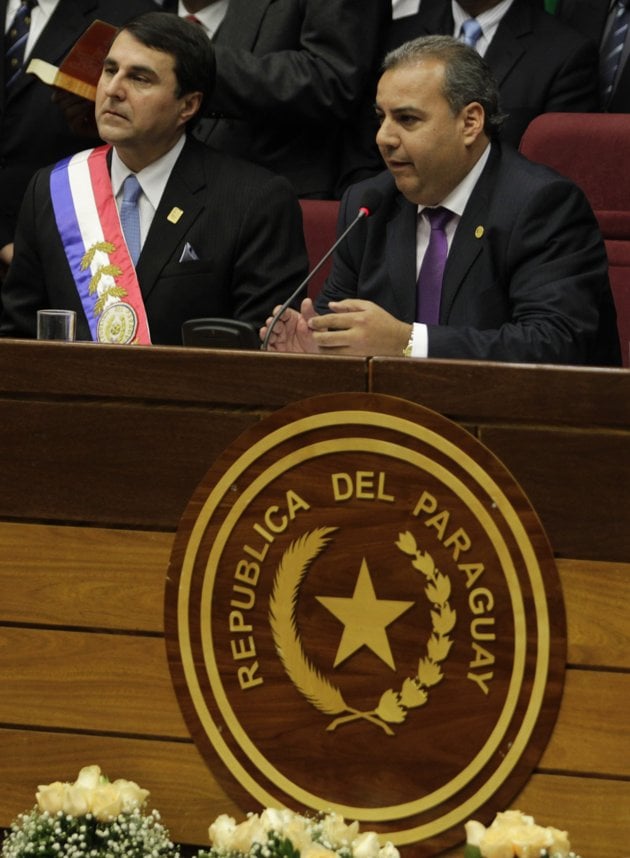
Federico Franco (right), who assumed the presidency of Paraguay on June 22 after the country’s legislature impeached previous President Fernando Lugo. Photo credit: Reuters/Jorge Adorno
Egypt is getting most of the headlines this week for its historic and dramatic change in leadership. But it is not the only country testing the strength of its democracy. Last Friday (June 22), the legislature of Paraguay removed President Fernando Lugo from office following an impeachment trial. Lugo referred to the act as an “express coup d’etat,” and a coup against “Paraguay’s history, its democracy.” The New York Times described the situation as a “political crisis.” Lugo became president in 2008, ending six decades of one-party rule in the poor, landlocked South American nation. Many are concerned that his ouster signals a return to autocratic practices.
FPA blogger Hunt Kushner discusses the political environment in Paraguay and reviews Lugo’s impeachment. I will just point out that the impeachment trial lasted only a few hours, and that Lugo was not given any time to prepare a defense (he did not defend himself in person either). The timing of these events is also of concern as Lugo had less than a year remaining in his term and is not permitted to run for re-election.
Still, it should be pointed out that the government did follow constitutional procedures for the impeachment. But while considered legal, many inside and outside the country are troubled by the developments. The executive director of a nongovernmental consortium in Paraguay stated that while legal, Lugo’s removal “is not legitimate.” The Inter-American Dialogue, a US-based research institute, took this position: “The [Paraguayan] Congress may have acted in accordance with the Constitution, but this is a setback for democracy nonetheless.” The Inter-American Commission for Human Rights, part of the Organization of American States, labeled the change in power “a parody of justice.”
Regional political groups including UNASUR (Union of South American nations) and MERCOSUR–the trading bloc that barred the new administration from attending a summit this week–have expressed displeasure and worry at the rapid removal of an elected leader. Some fear this is the start of the destabilization of democracy in the region.
That Lugo could not even serve out one term before being removed from office is certainly not a good start for democracy in Paraguay. But it should be asked, was his ouster deserving? Lugo, a former bishop, had a checkered past, admitting to fathering children out of wedlock. He’s also struggled to wrest power from the political and economic establishment. He was largely unable to redistribute land ownership more equitably as he had promised when elected. The wealthy class, entrenched in power, blocked attempts at reform. What should be asked is, are these failures sufficient grounds for impeachment?
It is the right of people in a democratic society to remove leaders from office if they are not governing justly. It’s one of the founding principles of this country (i.e., the U.S.). It seems to me that, assuming the impeachment was conducted within the bounds of Paraguay’s constitution (and not politically motivated), it should stand whether people like it or not. As I discussed with Egypt, sometimes democracy takes a country down a path it does not prefer or expect. The fact that democracy follows the will of people wherever it may lead is what makes it righteous.
So Federico Franco–vice president under Lugo–has taken control in Paraguay (as prescribed by constitutional law in the event of impeachment). Gaining the approval of regional powers Brazil and Argentina will be key in establishing legitimacy for the new government. We should hope that Paraguay will move forward and that Franco will respect the forces that brought him power and keep democracy on track.